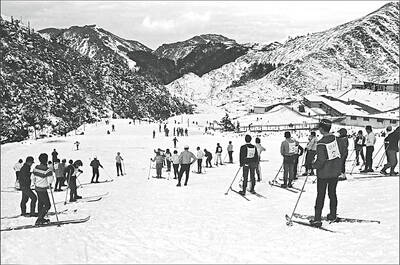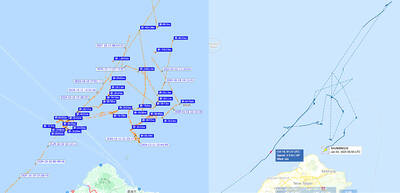National Communications Commission (NCC) Chairwoman Nicole Chan (詹婷怡) yesterday faced severe criticism from lawmakers, who said that the commission has failed to contain the spread of misinformation.
Lawmakers at the Legislative Yuan’s Transportation Committee yesterday focused on the commission’s handling of fake news, after Premier Su Tseng-chan (蘇貞昌) on Sunday accused the NCC of doing nothing about the issue.
The Satellite Broadcasting Act (衛星廣播電視法) not only authorizes the NCC to impose fines of NT$200,000 to NT$2 million (US$6,487 to US$64,868) on broadcasters that fail to verify facts and as a result hurt the public interest, but also to suspend the broadcast of programs or advertisements, or take rectification measures, Democratic Progressive Party (DDP) legislators Cheng Pao-ching (鄭寶清), Lin Chun-hsien (林俊憲) and Yeh Yi-jin (葉宜津) said.

Photo: Fang Pin-chao, Taipei Times
However, except fines, the commission has yet to use other measures permitted by the law to curb the dissemination of misinformation, they said.
So far, only TV news stations Eastern Broadcasting (東森電視) and CTiTV (中天電視) have each been fined NT$200,000 for failing to adhere to the fact-checking principles contained in the act, they said.
A false report by CTiTV that said farmers had dumped 1,200 tonnes of pomeloes into the Zengwen Reservoir (曾文水庫) last year because of low retail prices for the fruit was intended to change the outcome of Saturday’s legislative by-elections and hurt democracy, they said.
Chan should consider stepping down, as the premier, the Legislative Yuan and the public have lost trust in the commission’s ability to address misinformation, Lin said.
Chan said that all measures are designed to enhance the credibility of media, whether they are self-disciplinary mechanisms or regulations set by the authorities.
However, many cases have shown that broadcast media’s self-disciplinary mechanisms fail to produce the intended results, she said.
The commission plans to implement a series of measures to curb the dissemination of fake news by broadcast media, including asking them to incorporate fact-checking mechanisms into business plans, Chan said.
That does not mean that the NCC would interfere in the production of content, but it would allow the commission to check the procedures that TV stations have instituted to safeguard the quality of their content, she said.
The NCC’s content review committee, made up of independent experts from different academic disciplines, would convene more frequently than before to handle disputed broadcast content, Chan said.
Aside from asking broadcast media to have content reviewed by their own ethics committees, TV station managers would be asked to brief NCC commissioners in person on how certain content was produced if it receives complaints, she said.
Asked about Su’s comments, Chan said that the commission convenes and announces its rulings on different cases every week, and people can decide for themselves whether it is doing its job.
The commission would humbly accept all criticism from all parties, she said.
However, it already warned the Cabinet about the malicious effects on democratic values of misinformation and proposed possible solutions during a meeting in 2017, and the Cabinet ordered that all government departments work together to curb the spread of misinformation.
Meanwhile, former NCC chairwoman Su Herng (蘇蘅) said that Su’s top-down condemnation of the commission exposed his ignorance about the independence of the agency and was meant to pressure the NCC into doing what he said.

A strong continental cold air mass and abundant moisture bringing snow to mountains 3,000m and higher over the past few days are a reminder that more than 60 years ago Taiwan had an outdoor ski resort that gradually disappeared in part due to climate change. On Oct. 24, 2021, the National Development Council posted a series of photographs on Facebook recounting the days when Taiwan had a ski resort on Hehuanshan (合歡山) in Nantou County. More than 60 years ago, when developing a branch of the Central Cross-Island Highway, the government discovered that Hehuanshan, with an elevation of more than 3,100m,

Taiwan’s population last year shrank further and births continued to decline to a yearly low, the Ministry of the Interior announced today. The ministry published the 2024 population demographics statistics, highlighting record lows in births and bringing attention to Taiwan’s aging population. The nation’s population last year stood at 23,400,220, a decrease of 20,222 individuals compared to 2023. Last year, there were 134,856 births, representing a crude birth rate of 5.76 per 1,000 people, a slight decline from 2023’s 135,571 births and 5.81 crude birth rate. This decrease of 715 births resulted in a new record low per the ministry’s data. Since 2016, which saw

SECURITY: To protect the nation’s Internet cables, the navy should use buoys marking waters within 50m of them as a restricted zone, a former navy squadron commander said A Chinese cargo ship repeatedly intruded into Taiwan’s contiguous and sovereign waters for three months before allegedly damaging an undersea Internet cable off Kaohsiung, a Liberty Times (sister paper of the Taipei Times) investigation revealed. Using publicly available information, the Liberty Times was able to reconstruct the Shunxing-39’s movements near Taiwan since Double Ten National Day last year. Taiwanese officials did not respond to the freighter’s intrusions until Friday last week, when the ship, registered in Cameroon and Tanzania, turned off its automatic identification system shortly before damage was inflicted to a key cable linking Taiwan to the rest of

China’s newest Type-076 amphibious assault ship has two strengths and weaknesses, wrote a Taiwanese defense expert, adding that further observations of its capabilities are warranted. Jiang Hsin-biao (江炘杓), an assistant researcher at the National Defense and Security Research, made the comments in a report recently published by the institute about the Chinese Communist Party’s (CCP) military and political development. China christened its new assault ship Sichuan in a ceremony on Dec. 27 last year at Shanghai’s Hudong Shipyard, China’s Xinhua news agency reported. “The vessel, described as the world’s largest amphibious assault ship by the [US think tank] Center for Strategic and International